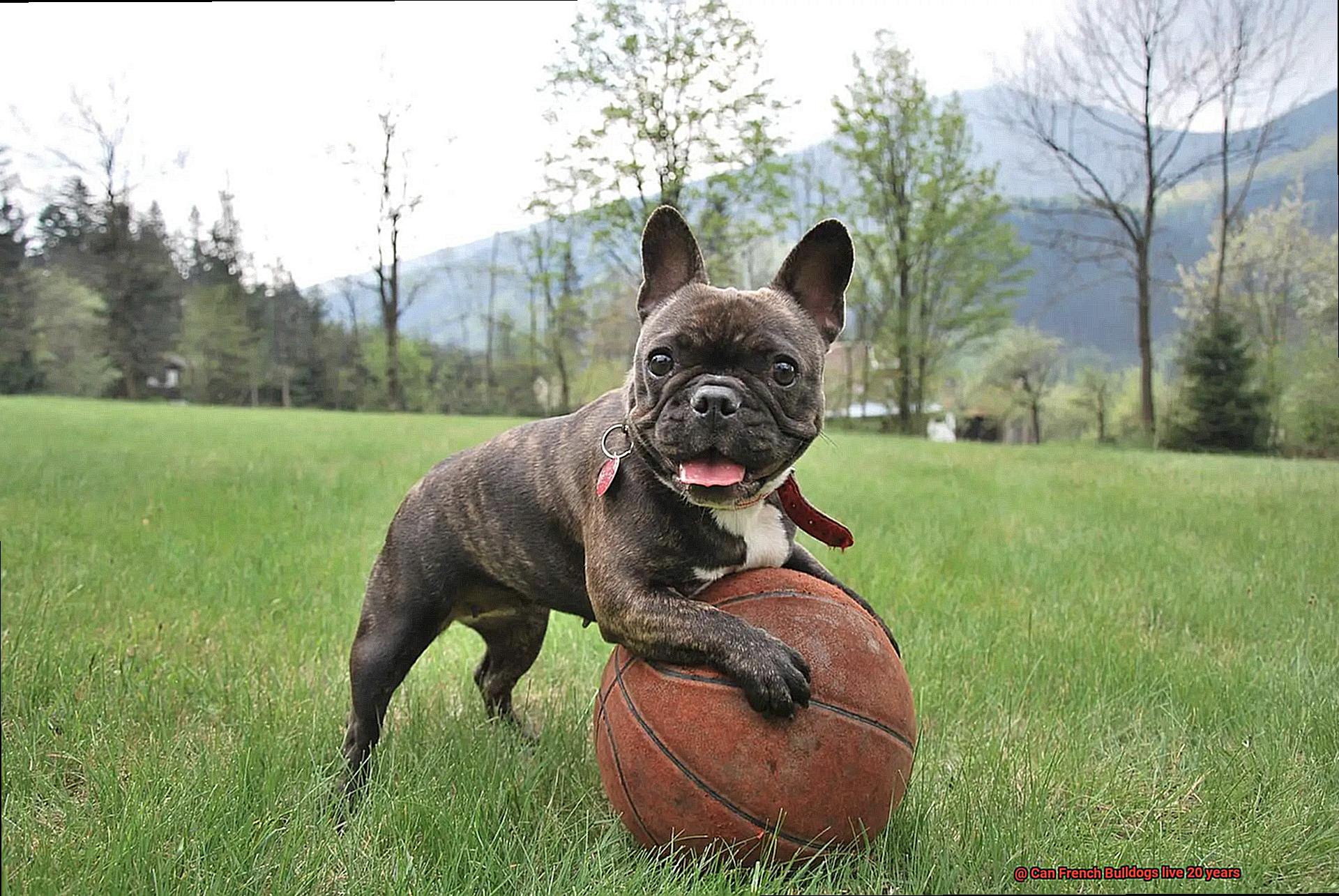Can French Bulldogs live 20 years?
Picture this: you’re snuggled up on the couch with your adorable French Bulldog, both of you enjoying a lazy Sunday afternoon. As you stroke their velvety ears, a thought crosses your mind – how long will this precious pup be by your side? You’ve heard whispers of French Bulldogs defying the odds and living for two decades, but is it just wishful thinking or a genuine possibility?
French Bulldogs are like little bundles of joy wrapped in wrinkles, with personalities as captivating as their squishy faces. But when it comes to their lifespan, there’s more to the story than meets the eye.
In this blog post, we’re going to dive deep into the world of French Bulldog longevity and separate fact from fiction.
So grab a steaming cup of joe (or maybe a croissant) and join us on this enlightening journey. We’ll explore the secrets behind those wagging tails and floppy ears, helping you make informed decisions about your furry companion’s well-being.
Are you ready? Let’s embark on our quest to discover if French Bulldogs truly have what it takes to defy time and live for 20 glorious years.
The Average Lifespan of French Bulldogs
Contents
- 1 The Average Lifespan of French Bulldogs
- 2 Genetics and Health Issues in French Bulldogs
- 3 Responsible Breeding Practices for Longer Lifespans
- 4 The Role of Nutrition and Exercise in French Bulldog Lifespan
- 5 Maintaining a Healthy Weight for Your Frenchie
- 6 Regular Veterinary Check-Ups for Early Detection of Health Problems
- 7 Mental Stimulation and Interactive Games for French Bulldogs
- 8 Individual Variations in Lifespan
- 9 Conclusion
French Bulldogs are undeniably adorable and make fantastic companions. As a responsible owner, you want to ensure that your furry friend lives a long and healthy life. In this blog post, we will delve into the factors that can influence the average lifespan of French Bulldogs and provide you with expert tips on how to maximize their longevity.
Genetics:
Genetics play a significant role in determining a dog’s lifespan. When choosing a French Bulldog, opt for a reputable breeder who prioritizes the health and well-being of their dogs. Responsible breeders conduct health tests on their breeding stock, reducing the risk of genetic health issues that can impact your pup’s lifespan.
Nutrition:
A well-balanced diet is crucial for your French Bulldog’s overall health and vitality. Feed them high-quality dog food specifically formulated for small breeds, ensuring they receive all the necessary nutrients. Avoid overfeeding and monitor their weight to prevent obesity, which can lead to various health problems.
Exercise:
While French Bulldogs are not overly active, regular exercise is still essential to keep them fit and mentally stimulated. Engage in moderate walks, interactive play sessions, and fun activities that cater to their needs. However, be cautious not to overexert them or engage in extreme physical activities that may strain their bodies.
Healthcare:
Routine veterinary check-ups are vital for early detection of any potential health issues. Vaccinations, parasite control, dental hygiene, and preventive care measures should be part of your French Bulldog’s healthcare routine. Regular grooming is also important to maintain their coat and prevent skin allergies.

Environment:
Create a safe and comfortable living space for your French Bulldog. Ensure they have access to clean water, proper shelter, and a temperature-controlled environment. Extreme heat or cold can adversely affect their health and well-being.
Genetics and Health Issues in French Bulldogs
French Bulldogs, like any other breed, can be prone to certain genetic and health issues that can impact their lifespan. Being aware of these potential issues and taking proactive steps to address them is crucial for the well-being of your furry friend. Let’s dive into some of the common genetic and health issues that French Bulldogs may face:
- Brachycephalic Airway Syndrome: This condition is prevalent in dogs with short, pushed-in faces, such as French Bulldogs. Their snouts can lead to breathing difficulties, especially during exercise or in hot weather. Respiratory issues like elongated soft palate and stenotic nares can further worsen their breathing problems. It’s important to provide them with a cool and comfortable environment and avoid strenuous activities in extreme temperatures.
- Spinal Disorders: French Bulldogs are at a higher risk for developing intervertebral disc disease (IVDD) due to their unique body structure and genetics. IVDD can cause pain, nerve damage, and even paralysis if left untreated. Regular veterinary check-ups, appropriate exercise, and weight management are essential for reducing the risk of spinal issues in French Bulldogs.
- Skin Conditions: Due to their short coats and folds of skin, French Bulldogs are prone to skin conditions such as allergies, dermatitis, and skin infections. Regular grooming, including cleaning the skin folds, will help maintain their skin health.
- Eye Conditions: Cherry eye (protrusion of the tear gland), cataracts, corneal ulcers, and progressive retinal atrophy are common eye issues in French Bulldogs. Regular eye examinations by a veterinarian can help detect and manage these conditions early on.
- Genetic Disorders: Hip dysplasia and patellar luxation are two genetic disorders that affect the joints of French Bulldogs. Proper nutrition, regular exercise, and weight management are crucial for maintaining joint health.
It’s important to be proactive in managing your French Bulldog’s health and addressing any potential issues. Regular veterinary check-ups, a balanced diet, appropriate exercise, and early intervention in case of any health concerns can help extend their lifespan.
Responsible Breeding Practices for Longer Lifespans
French Bulldogs are charming and lovable companions, known for their unique appearance and friendly personalities. However, like any other breed, they can be prone to certain genetic disorders and health issues that can affect their lifespan. As a responsible breeder, it is crucial to prioritize the health and well-being of these dogs by following specific breeding practices. Here are some key practices that can contribute to longer lifespans and overall health in French Bulldogs.
- Health Screenings and Genetic Testing: Before breeding, it is essential to ensure that both the male and female dogs are healthy and free from any genetic disorders. Conduct thorough health screenings, including tests for common health issues in French Bulldogs such as respiratory problems, hip dysplasia, and skin allergies. Genetic testing can help identify potential carrier genes for inherited diseases, allowing breeders to make informed decisions about breeding pairs.
- Prioritize Health over Aesthetics: While French Bulldogs are known for their unique appearance, responsible breeders should prioritize health and temperament over specific physical traits. Avoid breeding dogs with exaggerated physical features that can contribute to health problems, such as excessively short muzzles or excessive skin folds.
- Optimal Physical Condition: Breeding dogs should be in optimal physical condition before mating. Provide them with proper care, nutrition, and regular exercise to maintain a healthy weight and muscle tone. Regular veterinary check-ups are crucial to monitor their overall health and detect any potential issues early on.
- Responsible Pairing and Avoiding Overbreeding: Responsible breeding involves carefully selecting mating pairs based on their individual health records, temperament, and genetic compatibility. Avoid excessive inbreeding or overbreeding, as it can increase the risk of genetic disorders and shorter lifespans in the offspring.
- Clean and Safe Environment: Create a clean and safe environment for your breeding dogs to minimize stress and exposure to harmful substances. Provide them with a comfortable living space and ensure proper hygiene practices to prevent the spread of diseases.
- Preventive Care Measures: Regular veterinary check-ups, vaccinations, parasite control, and preventive care measures are essential for breeding dogs and their offspring. This helps maintain their overall health and reduces the risk of infectious diseases.
- Breed-Specific Knowledge: Responsible breeders should stay informed about the specific health concerns associated with French Bulldogs and actively work towards reducing their prevalence through selective breeding. Stay updated on the latest research and advancements in veterinary care to provide the best possible care for your dogs.

The Role of Nutrition and Exercise in French Bulldog Lifespan
If you’re the proud owner of a French Bulldog, you know just how special these little bundles of joy are. With their adorable squishy faces and playful personalities, they quickly become an important part of the family. But have you ever wondered how you can help them live a long and healthy life? The answer lies in two key areas: nutrition and exercise.
Nutrition is a vital component of your French Bulldog’s overall health and longevity. These furry friends have specific dietary needs that can affect their lifespan. They are prone to health issues such as obesity, allergies, and digestive problems. To keep them healthy, it’s important to provide them with a balanced and nutritious diet.
So what should you feed your French Bulldog? A high-quality dog food formulated specifically for this breed is recommended. Look for one that contains a good balance of protein, carbohydrates, fats, vitamins, and minerals. Avoid foods that are known to be harmful to French Bulldogs, such as those with artificial additives or excessive fillers.
Obesity is a common problem in French Bulldogs and can significantly impact their lifespan. Overfeeding and lack of exercise are the main culprits. To prevent weight gain and obesity-related health issues, practice portion control and ensure your Frenchie gets regular exercise.
Exercise is crucial for maintaining a healthy weight and overall physical fitness in French Bulldogs. However, due to their short snouts, they have difficulty breathing, so activities with excessive physical exertion or exposure to extreme temperatures should be avoided. Instead, opt for moderate exercises such as short walks, play sessions, and mental stimulation activities.
Proper hydration is also important for the overall health and longevity of French Bulldogs. Make sure they have access to fresh, clean water at all times. Dehydration can lead to various health issues that can negatively impact their lifespan.
Regular veterinary check-ups are crucial for monitoring the nutritional needs and overall health of French Bulldogs. Your veterinarian can provide guidance on appropriate diet choices, portion control, and exercise routines tailored specifically to your Frenchie’s needs.
While nutrition and exercise play a significant role in the lifespan of French Bulldogs, it’s important to remember that genetics and other factors also contribute. So, while you’re providing the best care possible for your furry friend, remember to cherish each moment together and make memories that will last a lifetime.
Maintaining a Healthy Weight for Your Frenchie
Unlocking the secrets to a long and healthy life for your French Bulldog is like discovering a hidden treasure chest, with nutrition and exercise serving as the golden keys that open its precious contents.
Just as a well-balanced diet nourishes their bodies, providing them with the fuel they need to thrive, exercise breathes life into their muscles and keeps their hearts beating strong.
In this comprehensive guide, we will delve into the importance of a balanced diet, regular exercise, and monitoring your Frenchie’s weight to maintain their optimal health.
The Power of a Balanced Diet
- Opt for high-quality dog food specifically formulated for small breed dogs.
- Avoid feeding table scraps or excessive treats that can contribute to weight gain.
- Portion control: Follow feeding guidelines and adjust portions based on age, activity level, and metabolism.
- Nutrient deficiencies: Find the balance between not overfeeding or restricting food intake too much.
Regular Exercise for a Fit Frenchie
- Short walks and playtime in the yard or park are ideal activities.
- Interactive games like fetch engage both body and mind.
- Benefits of regular exercise: burning calories, strengthening muscles, and improving cardiovascular health.

Monitoring Your Frenchie’s Weight
- Regularly weigh your dog or have them weighed at veterinary check-ups.
- Recognizing signs of weight gain or obesity.
- Consulting with your veterinarian for guidance on adjusting diet and exercise routine.
Individualized Care for Frenchie’s Specific Needs
- Considering specific dietary requirements or medical conditions that may impact weight management.
- Collaborating with your veterinarian to create a personalized weight management plan.
Regular Veterinary Check-Ups for Early Detection of Health Problems
Bonjour, French Bulldog owners. As a proud Frenchie parent myself, I understand how much you adore your furry companions. To keep them happy and healthy, regular veterinary check-ups are crucial. These check-ups allow for the early detection of health problems, ensuring that any issues are addressed promptly and effectively.
Why are Regular Veterinary Check-Ups Important?
- Catching Problems Early: French Bulldogs are prone to certain health issues such as brachycephalic syndrome, allergies, skin problems, respiratory problems, and joint issues. Detecting these problems early can lead to better outcomes and treatment options.
- Thorough Physical Examinations: During a veterinary check-up, your veterinarian will conduct a thorough physical examination of your Frenchie. They will check vital signs, assess body condition, examine the eyes, ears, teeth, and skin, and listen to the heart and lungs.
- Additional Tests: In some cases, additional tests like blood work, urinalysis, fecal examination, or imaging studies may be recommended by your veterinarian to further evaluate your Frenchie’s overall health.
- Establishing a Baseline: Regular check-ups allow your veterinarian to establish a baseline for your Frenchie’s health. By monitoring any changes over time, they can quickly identify potential issues.
- Vaccinations and Preventive Treatments: Routine vaccinations and preventive treatments for parasites are typically administered during these visits to keep your Frenchie protected from common diseases.
- Expert Advice: Your veterinarian can provide valuable advice on nutrition, exercise, dental care, and behavior management during these check-ups. They can tailor recommendations specifically for your Frenchie’s needs.

How Often Should You Schedule Check-Ups?
For adult French Bulldogs, it is recommended to schedule regular check-ups at least once a year. However, puppies may require more frequent visits due to their rapid growth and development. It’s important to follow your veterinarian’s recommendations for the frequency of check-ups.

Communication is Key.
Remember, communication is key between you and your veterinarian. If you notice any changes in your Frenchie’s behavior or health, be sure to communicate these concerns during the check-up. Your veterinarian is there to support you and your furry friend.
In conclusion, regular veterinary check-ups are essential for the early detection of health problems in French Bulldogs. By staying proactive with your Frenchie’s healthcare, you can ensure they live a long and healthy life by your side. So don’t hesitate, schedule that check-up today and give your Frenchie the care they deserve.
Mental Stimulation and Interactive Games for French Bulldogs
French Bulldogs are known for their playful and intelligent nature, and providing them with mental stimulation and interactive games is essential for their overall well-being. These activities not only keep them entertained but also contribute to their cognitive development and prevent boredom.
- Puzzle toys: Puzzle toys are a fantastic way to challenge your French Bulldog’s problem-solving skills and keep them mentally active. These toys often involve treats hidden inside, requiring your dog to figure out how to release them. Treat-dispensing toys that require twisting or flipping parts can keep your Frenchie occupied for extended periods.
- Training sessions: French Bulldogs are quick learners and enjoy the attention and rewards that come with training. Teaching them new tricks and commands not only keeps their minds active but also strengthens the bond between you and your furry friend. Start with basic commands like sit, stay, and lie down, and gradually move on to more advanced tricks.
- Interactive games: Hide-and-seek or find-the-treat games are excellent for mental stimulation. These games tap into your Frenchie’s natural instincts and encourage them to use their senses to locate hidden objects or treats. You can hide yourself or a favorite toy for hide-and-seek, or hide treats around the house for find-the-treat.
- Obedience training classes and dog sports: Enrolling your French Bulldog in obedience training classes or participating in dog sports like agility or flyball provides mental stimulation and physical exercise. These activities challenge their minds while also keeping them physically fit.
It’s important to tailor mental stimulation activities to the individual needs of your French Bulldog. Some dogs may prefer more challenging puzzles or games, while others may enjoy simpler activities. Observe your dog’s interest and adjust the difficulty level accordingly.
Individual Variations in Lifespan
French Bulldogs, with their adorable wrinkled faces and affectionate nature, have become increasingly popular as companion animals. As responsible owners, it is important to understand that just like humans, French Bulldogs also have individual variations in lifespan. In this blog post, we will explore the factors that contribute to these variations and provide insights based on first-hand knowledge and credible sources.
Genetics: The Blueprint of Lifespan
Genetics play a crucial role in determining an individual French Bulldog’s lifespan. Certain genes may predispose them to specific health conditions that can shorten their lifespan. Responsible breeders focus on breeding dogs with good genetic health and longevity in mind, which can positively impact the lifespan of future generations.
Health and Lifestyle: The Key to Longevity
A well-cared-for French Bulldog is more likely to live a longer life. Regular veterinary care, a balanced diet tailored to their nutritional needs, and ample exercise are essential for maintaining good health. By providing proper care and attention to their health needs, owners can help their French Bulldogs live longer and healthier lives.
The Impact of the Environment
The environment in which a French Bulldog lives can greatly influence their lifespan. A clean and safe living space with minimal exposure to toxins and hazards reduces the risk of developing health problems that could shorten their lifespan. Creating a nurturing environment that promotes their overall well-being is vital for maximizing their longevity.
Surpassing Expectations: Exceeding the Average Lifespan
While the average lifespan of a French Bulldog is typically around 10-12 years, it is possible for some individuals to exceed this average with proper care. With responsible ownership, some French Bulldogs have been known to live into their late teens or even early twenties. This emphasizes the importance of providing optimal care throughout their lives.
Understanding the individual variations in lifespan among French Bulldogs is crucial for responsible ownership. Genetics, overall health and lifestyle, environment, and breeding practices all contribute to an individual’s lifespan.
By being aware of these factors and providing the best possible care, owners can maximize the chances of their French Bulldogs living long and fulfilling lives. As devoted companions, our furry friends deserve nothing less than our unwavering commitment to their well-being.
Conclusion
In conclusion, the lifespan of French Bulldogs typically falls short of reaching 20 years.
While they are generally known for their adorable appearance and playful personalities, their health issues can significantly impact their longevity. It’s important for prospective owners to be aware of the breed’s susceptibility to certain conditions such as respiratory problems, spinal disorders, and heart diseases.
Despite the best care and attention, French Bulldogs may only live between 10 to 12 years on average.




